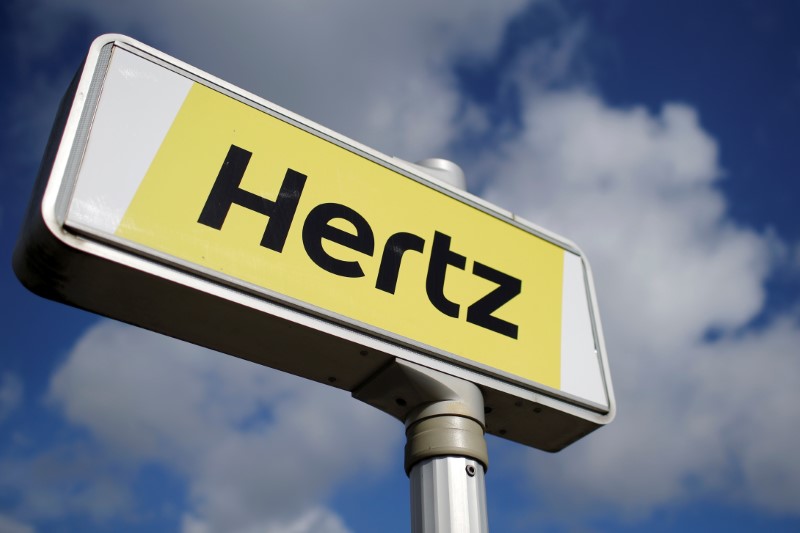(Bloomberg) --
Less than three months ago, Hertz Global Holdings (NYSE:HTZ) Inc. executives were touting a solid fourth-quarter performance and saying they’re entering 2020 in a strong position.
Today, they’re managing a crisis that has the company on the brink of bankruptcy, saddled with almost $21 billion of debt and a bloated fleet of vehicles that are depreciating in value as the Covid-19 crisis has ground much of the economy to a virtual standstill.
For Hertz, the No. 2 U.S. car renter, travel restrictions and shutdowns have brought about comeuppance for years of management missteps. This week, Paul Stone, who had been head of North American car-rental operations, became the company’s fifth chief executive officer since 2014.
With cash drying up and the price of used cars plummeting, Hertz has skipped vehicle lease payments and has until May 22 to work out an agreement with lenders and bondholders. The Wall Street Journal reported Wednesday that the company is seeking another 60-day forbearance to negotiate terms, citing a person familiar with the talks. Representative for Hertz didn’t immediately reply to Bloomberg’s request for comment.
While all travel-related companies have been hurt by the pandemic, a big part of what’s weighing on Hertz is its strategy of owning or leasing a large portion of its fleet outright instead of acquiring them through buyback agreements with manufacturers. Hertz owns about 89% of its U.S. fleet, compared with 66% at competitor Avis Budget (NASDAQ:CAR) Group Inc., according to Jefferies (NYSE:JEF) analyst Hamzah Mazari.
The U.S. car-rental industry is dominated by closely held Enterprise Holdings Inc., Hertz and Avis. They typically respond to a drop in demand by selling cars from their fleets into the used market and slowing new-car purchases. So when prices at used-car auctions tumbled due to the virus outbreak, Hertz took a much worse hit than Avis, Mazari said.
The fleet-ownership structure issue is one of many maladies that have been festering for years, according to analysts. Hertz also has had trouble navigating volatile used-car prices and the advent of ride-hailing. It’s had too big of a fleet and an outsize focus on gaining market share.
“It is incredible to me how their fortunes changed so quickly,” said Robert Rostan, the chief financial officer of Training the Street, which offers technical training to Wall Street firms, business schools, startups and private equity firms. “Even though they just finished a record year and things were looking fine, they were still operating on a razor-thin cushion of liquidity.”
As of the end of first quarter, Hertz had just over $1 billion in cash and equivalents, according to data compiled by Bloomberg.
A large part of Hertz’s current plight can also be traced to its $2.6 billion acquisition of Dollar Thrifty in 2012, under the leadership of then-CEO Mark Frissora. According to Millman Research Associates analyst Michael Millman, not only did Hertz pay too much, it also botched the process of integrating the two brands and failed to reap the benefits of the pricing power that such a consolidation typically brings.
Hertz “did very little with Dollar Thrifty, so it just sort of sat there,” Millman said in an interview.
At the same time, the company often sacrificed price for market share, which eventually hurt profitability. Hertz’s significant debt load also has stayed stubbornly high -- it dipped a bit in 2016 after the company’s spinoff of equipment-rental company Herc Holdings (NYSE:HRI) Inc., then quickly rose again.
“Hertz has had too much leverage for years, even with proceeds from the Herc Rentals’ spin,” Bloomberg Intelligence analyst Joel Levington said. The company had total debt of $20.6 billion as of March 31, according to data compiled by Bloomberg. Its market valuation now stands at around $425 million.
The struggles have long frustrated investors, including Hertz’s biggest stakeholder, Carl Icahn. His activism contributed to Frissora’s ouster in 2014 following disappointing earnings and accounting issues. The baton passed to an interim replacement and then to John Tague, who left in late 2016 after his efforts to raise prices led to market share losses. He was followed by Kathryn Marinello, who resigned May 16.
Shares of Hertz are trading near a record low, having plunged more than 80% this year. Avis has fared slightly better, dropping about 50%. The S&P 500 Index is down about 8%.
Hertz’s problems arguably originated in the 2013 as the company chased market share while failing to update its technology in keeping with the rest of the industry, Mazari of Jefferies said. It also didn’t refresh its fleet fast enough.
The company’s long-running turnaround efforts finally started showing some results late last year and in early 2020. But the coronavirus shutdowns led to an almost overnight disappearance of demand for rental cars.
Despite that, Avis has so far weathered the shock much better than Hertz, thanks to its business mix and a slightly better debt situation, according to Mazari.
“Avis was a much cleaner company to begin with,” he said. “They always maintained supply-demand balance pretty tightly, they were always rational with pricing and they always invested in the systems to be a better operator.”
©2020 Bloomberg L.P.
